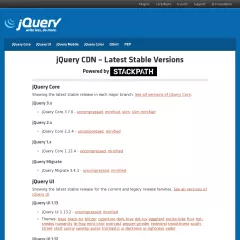jQuery CDN 
jQuery CDN is used by 0.83% of sites
Official Website
https://code.jquery.com/Category
CDN
The jQuery CDN (Content Delivery Network) is a service that hosts and distributes the jQuery library files to users across the internet. jQuery is a popular JavaScript library that simplifies HTML document traversal, event handling, and animation for web development.
Using a CDN for jQuery offers several benefits:
Faster Delivery: CDN servers are distributed geographically, allowing users to download the jQuery files from a server location that is closer to them. This reduces latency and improves the loading speed of jQuery, resulting in faster website performance.
Caching: CDN servers typically cache the jQuery files, meaning that if a user has previously accessed a website that uses the same jQuery version, their browser may already have the file stored locally. This eliminates the need to download the file again, further enhancing loading speed and reducing bandwidth usage.
Increased Availability: CDN services are designed to provide high availability and scalability. They have multiple servers spread across different locations, ensuring that the jQuery files are accessible even during high traffic periods or server outages.
Other popular CDNs that host jQuery files include Microsoft Ajax CDN and jQuery's own official CDN.
It's worth noting that using a CDN for jQuery offers the advantage of easy version management and updates. If a new version of jQuery is released, you can simply update the CDN link in your HTML code to fetch the latest version, without the need to manually download and update the library files on your server.
Using a jQuery CDN is a convenient and efficient way to incorporate jQuery into your web development projects, benefiting from improved loading speed, caching, and global availability of the library.
Using a CDN for jQuery offers several benefits:
Faster Delivery: CDN servers are distributed geographically, allowing users to download the jQuery files from a server location that is closer to them. This reduces latency and improves the loading speed of jQuery, resulting in faster website performance.
Caching: CDN servers typically cache the jQuery files, meaning that if a user has previously accessed a website that uses the same jQuery version, their browser may already have the file stored locally. This eliminates the need to download the file again, further enhancing loading speed and reducing bandwidth usage.
Increased Availability: CDN services are designed to provide high availability and scalability. They have multiple servers spread across different locations, ensuring that the jQuery files are accessible even during high traffic periods or server outages.
Other popular CDNs that host jQuery files include Microsoft Ajax CDN and jQuery's own official CDN.
It's worth noting that using a CDN for jQuery offers the advantage of easy version management and updates. If a new version of jQuery is released, you can simply update the CDN link in your HTML code to fetch the latest version, without the need to manually download and update the library files on your server.
Using a jQuery CDN is a convenient and efficient way to incorporate jQuery into your web development projects, benefiting from improved loading speed, caching, and global availability of the library.